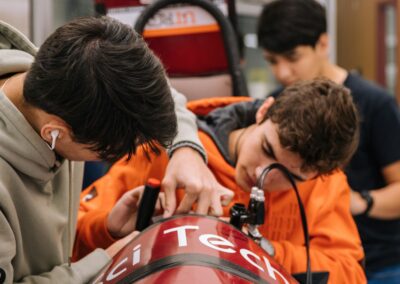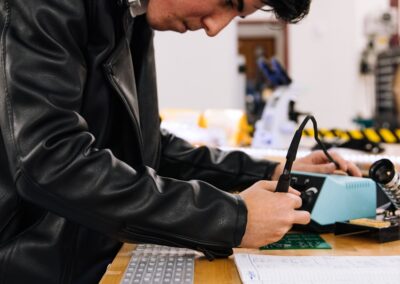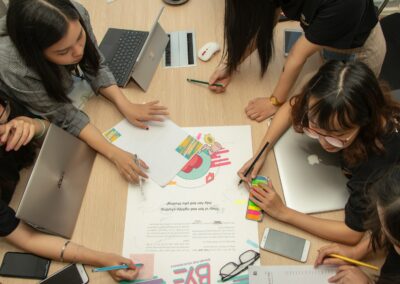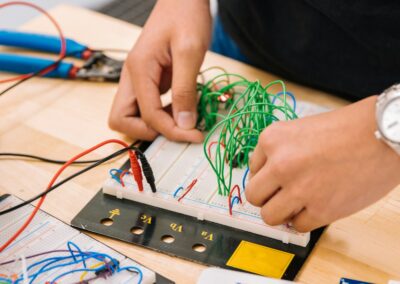Enhancing Education with Adaptive Learning Technologies
Understanding Adaptive Learning Technologies
The future of education is increasingly tied to the implementation of adaptive learning technologies, which use Artificial Intelligence (AI) to personalize learning experiences for each student. These technologies are designed to continuously assess student performance and adjust the content and difficulty level accordingly. This personalized approach not only enhances student engagement but also improves learning outcomes.
In Saudi Arabia and the UAE, educational institutions are rapidly adopting adaptive learning technologies to meet the diverse needs of their student populations. These countries are investing heavily in modern technology to create a more effective and inclusive education system. By leveraging AI, schools and universities in Riyadh and Dubai can offer tailored educational experiences that cater to individual learning styles and paces.
For example, an adaptive learning platform might present a student with a math problem and, based on the student’s response, immediately adjust the subsequent questions to better match the student’s skill level. This dynamic adjustment helps keep students challenged without overwhelming them, promoting a deeper understanding of the subject matter.
Implementing Adaptive Learning: Lessons from Successful Schools
The implementation of adaptive learning technologies in educational institutions requires careful planning and execution. Based on the experiences of successful schools and universities, several best practices have emerged that can guide other institutions in their adoption of these technologies.
Firstly, it is crucial to start with a pilot program. Schools and universities should initially implement adaptive learning tools in a limited number of classrooms or subjects. This phased approach allows educators to gather data, identify potential challenges, and make necessary adjustments before a full-scale rollout. For instance, a university in Dubai might begin by integrating adaptive learning into its introductory mathematics courses before expanding to other subjects.
Secondly, ongoing professional development for educators is essential. Teachers need to be trained on how to use adaptive learning technologies effectively. This training should cover not only the technical aspects of the tools but also how to interpret the data generated by these systems to inform instructional strategies. In Riyadh, for example, schools might offer workshops and training sessions to ensure that teachers are comfortable and proficient with the new technologies.
Lastly, it is important to involve all stakeholders in the implementation process. This includes teachers, students, and parents. By fostering a collaborative environment, schools can ensure that the transition to adaptive learning is smooth and that any concerns are addressed promptly. Engaging stakeholders early in the process can also help build support and enthusiasm for the new technology.
Measuring the Impact of Adaptive Learning Technologies
To ensure the successful implementation of adaptive learning technologies, it is vital to measure their impact on student performance and engagement. Schools and universities should establish clear metrics and regularly assess the effectiveness of the technologies they have implemented.
One key metric is student performance. Institutions should track how students’ grades and test scores change after the introduction of adaptive learning tools. For example, a school in the UAE might compare the math scores of students using adaptive learning platforms with those in traditional classrooms to evaluate the effectiveness of the technology.
Another important metric is student engagement. Adaptive learning tools should increase student engagement by making learning more interactive and personalized. Schools can measure engagement through student surveys, attendance records, and participation rates. A university in Riyadh, for example, might conduct regular surveys to gather student feedback on the adaptive learning platforms and make adjustments based on their responses.
Additionally, it is essential to monitor the professional development of teachers. Schools should assess how well teachers are adapting to the new technologies and whether they are effectively using the data provided by adaptive learning tools to enhance their instruction. In Dubai, teacher performance reviews might include an evaluation of how well they are integrating adaptive learning into their teaching practices.
Future Trends in Adaptive Learning Technologies
Advancements in AI and Machine Learning
The future of adaptive learning technologies is closely linked to advancements in AI and machine learning. As these technologies continue to evolve, they will become even more effective at personalizing education and improving learning outcomes. In Saudi Arabia and the UAE, where there is a strong emphasis on technological innovation, these advancements will play a critical role in shaping the future of education.
AI-powered adaptive learning platforms will become more sophisticated, capable of analyzing vast amounts of data to provide even more precise and personalized learning experiences. For example, machine learning algorithms might be able to predict a student’s future performance based on their current learning patterns and provide targeted interventions to address potential issues before they become significant problems.
Moreover, the integration of augmented reality (AR) and virtual reality (VR) into adaptive learning platforms will create more immersive and engaging learning experiences. In Riyadh and Dubai, educational institutions are already exploring the use of AR and VR to enhance traditional learning methods and provide students with a more interactive and hands-on learning environment.
Ensuring Equity and Accessibility
As adaptive learning technologies become more widespread, it is crucial to ensure that they are accessible to all students, regardless of their background or learning needs. Equity and accessibility should be at the forefront of any implementation strategy.
In the UAE and Saudi Arabia, educational institutions are committed to providing high-quality education to all students. Adaptive learning technologies can help achieve this goal by offering personalized support to students with diverse learning needs. For example, adaptive platforms can provide additional resources and tailored instruction to students with learning disabilities, ensuring that they receive the support they need to succeed.
Furthermore, adaptive learning technologies can help bridge the gap between urban and rural education. By providing personalized and flexible learning experiences, these technologies can ensure that students in remote areas have access to the same quality of education as those in urban centers. This commitment to equity and accessibility will be crucial in shaping the future of education in Saudi Arabia and the UAE.
Building a Culture of Continuous Improvement
Finally, the successful implementation of adaptive learning technologies requires building a culture of continuous improvement. Educational institutions should constantly evaluate their use of adaptive learning tools and seek ways to enhance their effectiveness.
This culture of continuous improvement can be fostered through regular feedback and collaboration among all stakeholders. Schools and universities should encourage teachers, students, and parents to provide feedback on the adaptive learning platforms and use this feedback to make data-driven decisions. In Dubai and Riyadh, institutions might establish committees or working groups to oversee the implementation and continuous improvement of adaptive learning technologies.
In conclusion, the best practices for adaptive learning technology implementations involve careful planning, ongoing professional development, stakeholder engagement, and a commitment to equity and accessibility. By following these practices, educational institutions in Saudi Arabia, the UAE, and beyond can create more personalized, effective, and inclusive learning environments. Embracing adaptive learning technologies presents an opportunity to enhance educational outcomes, improve student engagement, and drive business success in the digital age.
—
#AdaptiveLearning, #BestPractices, #AIinEducation, #EducationInnovation, #UAE, #SaudiArabia, #Riyadh, #Dubai, #ModernTechnology, #BusinessSuccess, #LeadershipSkills, #ProjectManagement























